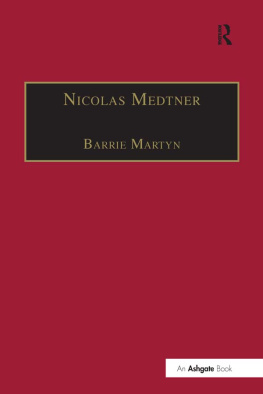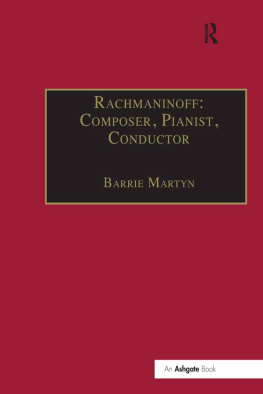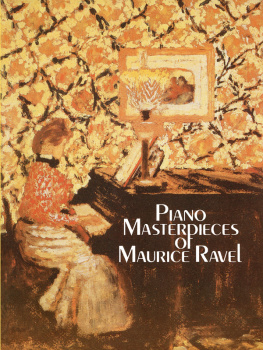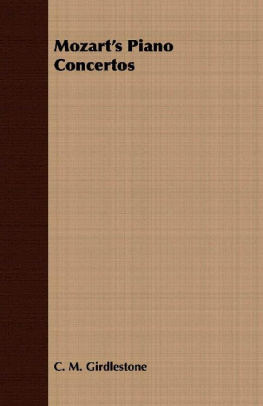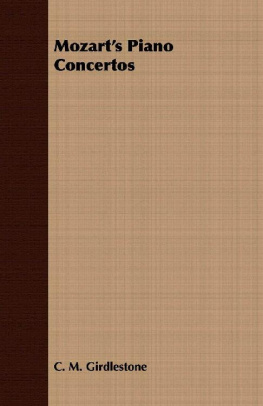
NICOLAS MEDTNER
His Life and Music
To Edna Iles
with respect
First published 1995 by Ashgate Publishing
Published 2016 by Routledge
2 Park Square, Milton Park, Abingdon, Oxon OX14 4RN
711 Third Avenue, New York, NY 10017, USA
Routledge is an imprint of the Taylor & Francis Group, an informa business
Copyright Barrie Martyn, 1995
All rights reserved. No part of this book may be reprinted or reproduced or utilised in any form or by any electronic, mechanical, or other means, now known or hereafter invented, including photocopying and recording, or in any information storage or retrieval system, without permission in writing from the publishers.
Notice:
Product or corporate names may be trademarks or registered trademarks, and are used only for identification and explanation without intent to infringe.
British Library Cataloguing in Publication Data Martyn, Barrie
Nicolas Medtner: His Life and Music
I. Title
780.92
Library of Congress Cataloging-in-Publication Data
Martyn, Barrie.
Nicolas Medtner : his life and music / Barrie Martyn.
p.cm.
Includes bibliographical references (p. ) and indexes.
1. Medtner, Nikolay Karlovich, 1880-1951.2. Composers Russia (Federation)Biography.I. Title.
ML410.M46M371995
780.92dc209511401
[B]CIP
MN
ISBN 13 : 978-0-85967-959-6 (hbk)
Contents
Between pages 82 and 83
Between pages 178 and 179
Between pages 210 and 211
The following music publishers have kindly given permission to reproduce extracts from their copyright scores:
M. P. Belaieff, Frankfurt, Exs 46, 131;
Boosey & Hawkes Music Publishers Ltd, Exs 2971;
Rob. Forberg P. Jurgenson, Musikverlag, Bonn, Exs 13, 728;
Stainer & Bell Ltd, Exs 116 and 117;
Zimmermann, Musikverlag, Frankfurt, Exs 72108, 118130.
Exs 109115 are taken from works originally published by Novello & Co. Ltd, London, and from a Medtner song anthology published by G. Schirmer Inc., New York.
The extract from Sergei Prokofiev: Soviet Diary 1927 and Other Writings, translated and edited by Oleg Prokofiev, appears by kind permission of the publishers, Faber & Faber Ltd.
Sources and permissions for the photographic illustrations are as follows:
Glinka Museum, Moscow: jacket, 19, 11;
Edna Iles: 12, 14, 15;
Popperfoto: 13, 1721;
Authors Collection: 10, 16, 2224.
In the history of Russian music, Nicolas Medtner is a forlorn figure. A younger contemporary of Scriabin and Rachmaninoff, he was, like them, a great pianist and a composer whose work focused mainly on his own instrument. If his career had taken off like theirs, he might have come to be regarded as completing a Moscow musical triumvirate; instead, lacking the mystique of the former and the popular appeal of the latter, he was from the first overshadowed, his work highly prized by a small band of faithful admirers but, even to this day, never becoming familiar to a wide audience.
Medtners life and work have attracted little serious study. Many biographical details have remained obscure, and over the years ill-informed critics have persistently made wildly misleading pronouncements about the nature of his art, at first pigeon-holing him as the Russian Brahms (a sobriquet he particularly disliked) or more generally as a German composer Russian only through accident of birth. Later, and no less perversely, he was dismissed as merely a pale copy of Rachmaninoff, a view still current in some quarters. The present study attempts to clarify the facts of his career and, through an examination of the works, dispel at least some misapprehensions about his music.
What are the qualities in Medtner which his admirers find so appealing and on which they would base their claim that, far from deserving neglect, he should in fact be ranked among the great composers of the 20th century? Firstly, this self-declared pupil of Beethoven was unquestionably a wonderful craftsman, a master contrapuntist and one of musics great architects. Taneyev described him as being born with sonata form, and certainly he had a grasp of large-scale structure such as few Russians have possessed. This is most clearly demonstrated in the Concertos and Sonatas, in which a characteristic ploy, exemplified at its finest in the Sonata in E minor, Op. 25, No. 2, is to show at the end of a work that all its themes, though apparently widely diverse, emanate from a single source. Such writing is intensely satisfying, musically and intellectually.
Then there is the rich vein of lyricism in the music, affecting but never sentimental. In some of his works, most notably in the Concertos and the songs to German texts, Medtner, like his compatriot Taneyev, exhibits no specific national identity, but when he sets Russian poetry or, as in some of the so-called Fairy Tales, treats Russian themes, his nationality strongly asserts itself. If his melodies lack the overwhelming emotional impact of Rachmaninoff, occasionally a certain stylistic kinship can be felt between the two composers; however, as Rachmaninoff himself remarked, Medtner is too much an individual to bear resemblance to anyone except the Russian composer Medtner.
This individuality is perhaps most evident in his use of rhythm, where unusual metres and syncopation are often distinctive features of the fabric of the music, while an extensive use of cross rhythms reveals a surprisingly progressive aspect of an otherwise conservative musical personality. In terms of harmony, though using it distinctively for his own ends, the composer worked within the boundaries set by the masters of the 18th and 19th centuries. In general his style may be said to have developed hardly at all throughout his career; he emerged fully-fledged with his earliest published works, his entire oeuvre being remarkably consistent in quality.
For Medtner his muse and his God were indivisible, his art a profession of faith. Informed by a lofty purpose, his music often expresses the most noble human feelings and his song texts are invariably chosen from poetry of the highest quality. Indeed, it is perhaps among the best of the songs, which demonstrate his strengths in their most concentrated form, that the composers finest work is to be found.
Although he devoted his creative energy mainly to the piano and included it in every work he wrote, as had Chopin and Alkan before him, Medtners range of expression is as wide as that of composers who have written for every kind of medium. His understanding of the potentialities of the instrument was so complete that he was able to realize his ideas through it fully and without compromise. His only use of the orchestra is in the Concertos; he really had no need of it elsewhere. He despised orchestral colouristic effects as adding nothing to the essential nature of a musical statement, just as in his piano writing he eschewed sonority and sensuousness for their own sakes.
Medtner cheerfully admitted that he was something of an anachronism. His natural musical sympathies lying with the western classical masters on the one hand and with Tchaikovsky on the other, he began his career at the very point when music was about to be led in new directions, in Europe by Strauss and Schonberg, and in his own country by Stravinsky and Prokofiev, for all of whom he developed an almost pathological distaste. He reacted with horror at what he saw as the overthrowing of the immutable laws of art and all his life raged against modernist heresy, but in the end could only look on impotently and with mounting despair as musical evolution took its course. The conservatism of his own musical style helped to ensure that his work was ignored by the arbiters of fashion.
Next page
